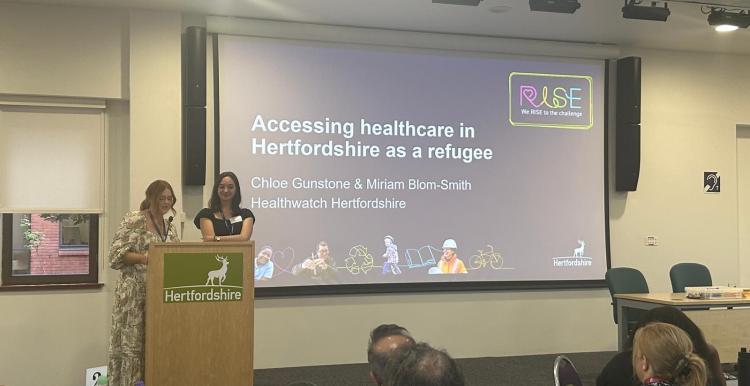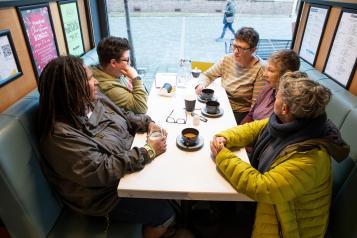‘Lost in the System’ - health and care barriers for refugees and asylum seekers in Hertfordshire
In this report, we heard from refugees and asylum seekers, who face significant health inequalities – for example, they are five times more likely to have mental health support needs. They arrive here with significant trauma, which exacerbates their difficulties in accessing health and care services, in addition to the challenges faced by all Hertfordshire residents.

Our Report shares the experiences of 32 people with asylum seeker or refugee status living in Hertfordshire, and professionals which support them. People we spoke to had markedly different experiences if they were living in a hotel, compared to those living with a host in a private home.
We found that refugees and asylum seekers often have limited awareness and understanding of the NHS system and how to access support they are eligible for. This is exacerbated by language difficulties, traumatic backgrounds, social isolation, frequent accommodation moves and poverty.
We call for action from local providers and our work will feed into the strategic work of Hertfordshire County Council, aimed at improving the wellbeing of refugees and asylum seekers.
What did we do?
Between December 2024 and March 2025, we spoke with 32 refugees and asylum seekers across Hertfordshire through one-to-one interviews and focus groups, as well as professionals and volunteers working directly with them.
Participants came from at least 13 different countries and the most common reason given was to escape war or conflict in their country of origin. We heard from 20 women and 12 men, many of whom also had children with them.
Our research aimed to:
- Listen to and amplify the voices of refugees and asylum seekers in Hertfordshire
- Understand the barriers that refugees and asylum seekers face in relation to accessing health and social care and how they navigate the healthcare system
- Highlight the specific physical and mental wellbeing needs that arise from being a refugee or asylum seeker
- Share best practice and make recommendations to health and care services about how they can improve
What did people tell us?
Key themes came out of our discussions and these included:
- Food and Nutrition: People living in hotels felt they and their children were not always provided with food that was nutritious or suitable for individual medical and cultural needs.
- Children’s Health and Maternity Care: Parents were worried about children’s health and development due to difficult living conditions and poor nutrition.
- Emotional Wellbeing: Refugees and asylum seekers generally have very poor emotional wellbeing, due to isolation and trauma, and struggle to access support.
- GP Services and Hospital Care: People did not always understand the healthcare system and how to access services if they needed them, such as registering with a GP.
- Communication and Accessing Care: There were challenges in accessing healthcare due to the language barrier and translations services were not always available.
In their own words - quotes from people we spoke to:
“When everyone is asleep, I cry. Everything just comes over you.”
“I’m at breaking point but trying to keep going for my kids. As bad as the situation is, it’s still better than where we came from. Nobody is abusing us.”
“I had to leave because of conflict in my home country. I feel very depressed. I have some trauma from what I have seen. I was told I would be waiting a very long time for help. I am lucky to be supported
“It is very difficult living here and stuck in one room and nothing else to do.”
“I was depressed, I didn’t leave my room. I am alone without any friends or family.”
“The food is very bad. It is not healthy. I buy vitamins for the grandchildren. We’ve been told they can’t change the menu.
“My children are always sick. They are always unwell. They are so unhealthy. They have had so many antibiotics. My son is always taking antibiotics. Not long ago my children all got scabies.”
“Doctors avoid or reject or for some reason they do not provide a translator, and I have to go and translate or over the phone translate what he’s describing. And again, I’m not a certified translator and I shouldn’t do that but just because I know there is no one who will pick up the phone and do that, so I do it. Sometimes for me, I struggle with medical diagnosis and everything to translate.”
What change do we want to see?
We have been working with partners to address our recommendations.
- The food provided at accommodation sites needs to be nutritionally sufficient, more flexible and accommodating of different medical and cultural needs
- Accommodation providers should build links with voluntary and community groups to provide wellbeing activities and enable people to be part of community life
- As is recommended nationally, newcomers should be offered an initial health and wellbeing check upon registration with a GP surgery and be supported to understand the healthcare system and what to expect.
- Everyone who needs professional translation and interpretation services should have these available when interacting with the healthcare system
- All accommodation providers to offer a consistent level of support, including guidance with accessing healthcare and signposting to services such as family centres
- Create an information resource in a range of languages, for refugees and asylum seekers on how to navigate the health and care system.
"In recent years, the wider partnership in Hertfordshire has worked effectively and collaboratively at speed to respond to increasing numbers of refugees and asylum seekers coming into the county. However, there is more work to be done, and it is important that this work is shaped by the people most affected and with the most relevant experience. That is why this Healthwatch project is an important step forward in our local discussion. The research, report and recommendations will be invaluable in helping to steer the next steps for Hertfordshire County Council and our many partners in Districts and Boroughs, health services, and voluntary, community, faith and social enterprise organisations."
Downloads
Click here to download the full Lost in the System Report


